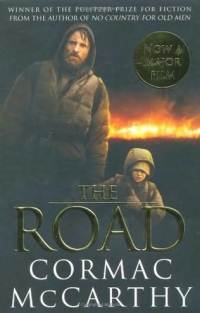The Road by Cormac McCarthy
 Saturday, January 29, 2011 at 2:13PM
Saturday, January 29, 2011 at 2:13PM 
Published by Knopf on September 26, 2006
Cormac McCarthy reduced this story to its raw elements: no names, not many characters, dialog that barely rises above a series of grunts. We don't see the apocalypse happen, we never learn its cause; we see only a journey through a dying world. The Road is a story of survival in desperate times, of a father's love for his son, and of a sort of honor or integrity that the man wants to instill or preserve in his son (represented by the man's insistence that they are "carrying the fire" as they travel down the road). I think McCarthy accomplished the task he set for himself: by telling a simple, elemental story, he got his point across. The doesn't necessarily mean that he wrote a great novel.
These are the reservations that keep me from giving the novel my highest recommendation: I think reducing the story to its raw elements left the reader with too little. With so few characters and so little character development, the story hinges on the man, and I don't think he's sufficiently interesting to carry the novel. The man's character depends almost entirely on machismo: Man strong. Man protect child. Man carry fire. McCarthy's portrait of the ideal man as a strong, silent warrior (represented by the boy's father and by the man who comes along at the novel's end) was just a little much for me. That's particularly true when the man is contrasted with his wife. She's portrayed as too weak-willed to struggle, too lacking in courage to assure her child's survival. Man strong, woman weak: at least that's the message I got. And the "carry the fire" metaphor (in the boy's words, "we're the good guys") was too simplistic to resonate with me. The novel gives us only binary choices: survival or suicide, good guys or cannibals. Reducing the world to a few good people and a lot of monsters might be a useful way of making a point about the difference between good and evil, but the world is a whole lot more complex than that -- and it continues to be more complex than that even in the face of disaster, as the multiple responses to events like Hurricane Katrina reveal. Finally, McCarthy's attempts at philosophy -- the suggestion, for instance, that people who would destroy their planet are unworthy of God -- are stale, recycled from countless other novels.
There is nonetheless much to admire in The Road: vivid writing; beautifully described scenes of desolation; honest depictions of love and fear; the boy's purity as he stands in for his father's conscience; haunting images and tender moments that stuck with me long after I finished the novel. I can't give The Road my strongest recommendation (I actually prefer a more inspirational and, I think, more complex post-apocalyptic novel, The Postman, even if David Brin's writing isn't as powerful) but there are enough memorable moments in The Road to make it worth reading.
RECOMMENDED